“First-class Medical Staff & comprehensive System”
Siloam Eye Hospital will Safeguard your Health.

What is Presbyopia?
Presbyopia refers to the condition where the eye degenerates due to aging, making it difficult to see close objects or text without prescription glasses or a magnifying glass. According to a recent study, the human eye gradually becomes larger with age similar to how an onion grows. As the space between the eye lens and the ciliary muscle connected by the ciliary follicle gradually narrows with age, presbyopia occurs resulting in a natural decrease and worsening of near vision.
Symptoms of Presbyopia
Presbyopia usually occurs in adults after the age of 40; however, if for those with hyperopia [ farsightedness ], the condition can also occur at a much younger age. Work requiring long periods of focus or attention to detail becomes difficult and additionally, the symptom of having trouble transitioning focus from distant to nearby objects may occur. Reading for extended periods of time may tire one’s eyes or produce headaches, even leading to blurred and discomfort. Under poor lighting conditions, these symptoms can become more pronounced or severe.
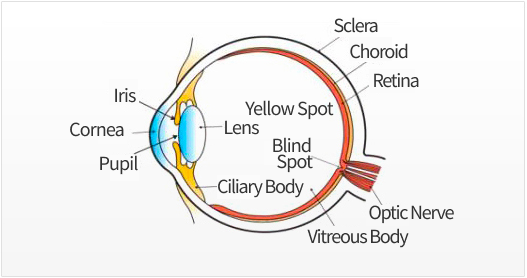
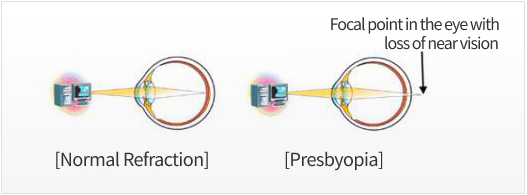
Multifocal Intraocular Lens Implantation
Advantages and characteristics of multifocal intraocular lens implantation
Multifocal intraocular lens implantation is a surgical method of removing cataracts and correcting presbyopia by inserting an artificial multifocal lens. Unlike conventional cataract surgery, it results in improvement of both far and near vision with a single procedure.
Multifocal intraocular lens implantation uses a minimal incision method of 2.8mm. Postoperative astigmatism is less, and recovery is quick, and distant and near vision are restored at the same time. According to the US FDA clinical trial, more than 80% of patients who underwent surgery reported that they could live without glasses, and 94% responded that they would choose the multifocal intraocular lens even if they had surgery again, indicating a high level of satisfaction.
In addition, it significantly reduced night vision disorders caused by unsatisfactory intermediate distance vision, halos, and light bleeds, which were problems with existing presbyopia correction surgery. In addition, with the approval of the US FDA, it is currently being actively performed in major developed countries.
When multifocal intraocular lens implantation is possible
- If the corneal astigmatism is not severe before surgery and the nearsightedness or farsightedness is severe
- If you want to restore near and far vision at the same time through cataract surgery
- If there is no eye disease such as corneal opacity, retinal abnormality, glaucoma, or systemic disease such as diabetes
- If you rarely work in a dark place, or if you don’t drive much at night
Multifocal Lens Types
- ReSTOR Lens
- TECNIS Multifocal Lens
- AT LISA lenses by Zeiss
- LENTIS Mplus Lenses by Oculentis

ReSTOR Lens Implantation
While the existing cataract surgery was a surgery that removes the cloudy lens and inserts an artificial lens that can see well at a distance, ReSTOR implantation removes the cataracted eye lens and puts in its place an artificial lens that can restore both near and far vision at the same time. It is an innovative surgical method that simultaneously resolves cataracts while also correcting vision. This surgery significantly resolves various problems found in existing presbyopia correcting lenses— unsatisfactory near vision, poor night vision, blurred or doubled lights at night.
ReSTOR lens implantation is a surgical method that solves both presbyopia and cataracts, known as geriatric eye diseases, with one simple surgery.
Advantages & Features of ReSTOR Lens Implantation
ReSTOR lens implantation is an effective surgery for those who need cataract surgery and want to correct presbyopia. In this surgery, you can see the effect of correcting presbyopia with a special lens that is inserted after the cataract is removed.
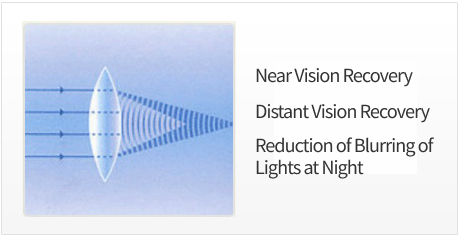
- Nine concentric circles are finely machined n the center of the lens surface, to reduce its thickness to 1/50~1/300 the width of a human hair.
- The advanced design of this lens minimizes the disadvantages of general multifocal lenses—less than optimal near vision, night vision disturbance, and the blurring or doubling of lights at night.
- Unlike glasses or magnifying glasses, ReSTOR lens allows for semi-permanent improvement with a single procedure, and since it is comprised of harmonious substances compatible with eye tissue, the implant leaves no discomfort and the eye feels just as natural as before the procedure.
- ReSTOR lens has proven effective and was deemed safe by the FDA of the United States, which was quickly followed by its certification in Europe in April 2003. ReSTOR lens has also been approved by the Korea Food and Drug Administration (KFDA), as its use has been widely adopted in major developed countries around the world.
ReSTOR Lens Implant Surgical Procedure
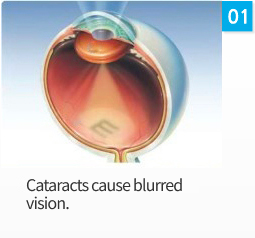
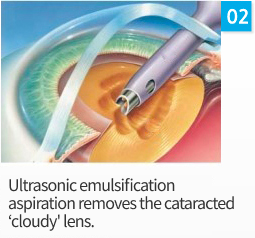
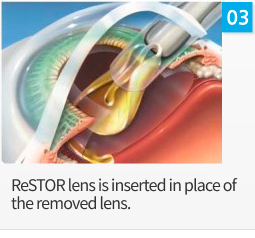
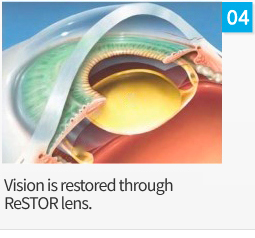
TECNIS Multifocal Lens Implantation
The TECNIS Multifocal Lens is made of silicon and it has a diameter of 6mm. This lens differs from other more conventional multifocal lenses in that its aspherical surface allows for multiple focal points improving the quality of vision at different distances.
Advantages of TECNIS Multifocal Lens Implantation
As TECNIS multifocal lenses simultaneously correct near and far vision, they provide comfort and allows patients to return to a normal life free from the need for magnifying glasses or framed glasses for reading, etc.
- Allows excellent near vision form objects 30 cm or less
- Made of Silicone, offering UV protection
- Simultaneously corrects far and medium distance vision
- Allows for safer driving with excellent night vision
- World-proven reliability and effectiveness
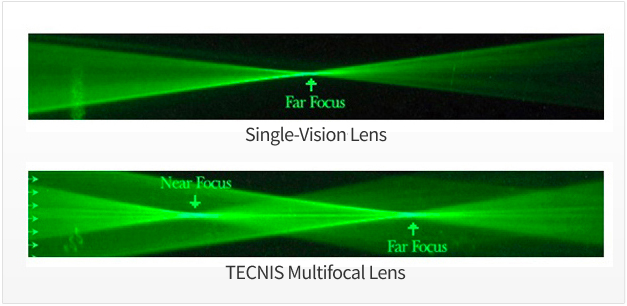
TECNIS Multifocal Lens Implantation Surgery Procedure

AT LISA Trifocal Lens Implantation
AT LISA lens implantation surgery significantly reduces the negative side effects associated with existing presbyopia correcting lenses—less than optimal near vision, night vision disturbance, and the blurring or doubling of lights at night. AT LISA Trifocal Lenses incorporated state-of-the-art optical technologies developed by ZEISS, a company renown for its camera lens advancements. AT LISA Trifocal Lenses automatically adjust the amount of light transmitted to the retina, allowing optimal near, medium, and far vision.
Advantages and Features of AT LISA Lens Implantation

-
- Allows excellent near vision form objects 30 cm or less
- Made of Silicone, offering UV protection
- Simultaneously corrects far and medium distance vision
- Allows for safer driving with excellent night vision
- World-proven reliability and effectiveness




